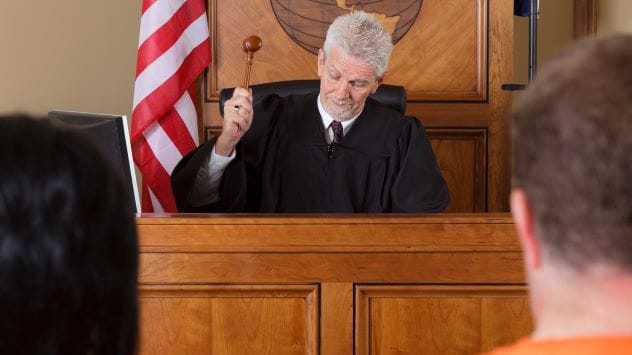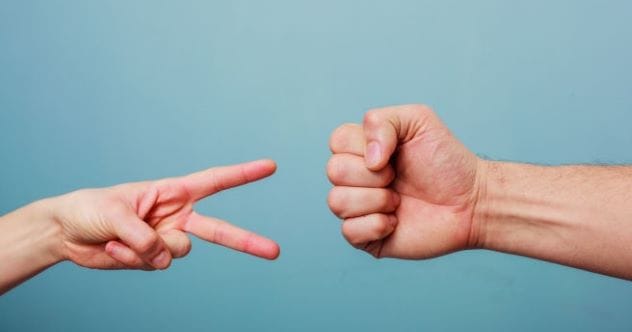Rock Paper Scissors is a game known and loved by millions across countless cultures. Often used to settle small disagreements, it’s also a fascinating example of game theory. While many don’t give it a second thought, few games are as widespread or have such a unique and surprising history. Get ready to explore the world behind this simple yet profound game!
Here are ten intriguing facts about Rock Paper Scissors that will change how you see it!
10. A Game by Any Other Name
In Northern California, Rock Paper Scissors is often called Roshambo. The strange thing is, nobody is quite sure where the name “Roshambo” came from. Many people think it has French roots and is connected to the Comte de Rochambeau, a French nobleman who fought in the American Revolutionary War and was even a character in the musical Hamilton. Legend says he played the game, but historical evidence suggests it wasn’t known in America during his time.
The first time “Roshambo” appeared in writing was in “The Handbook for Recreational Leaders,” published in Oakland, California. The word doesn’t seem to have a clear meaning in any language, leaving its origin a mystery. A popular theory is that “Roshambo” is an Americanized version of “Jon Ken Pon,” which is the Japanese name for the game. The large East Asian population in that area of the U.S. might have made children familiar with the Japanese name. Combined with the heavy emphasis on Revolutionary War history in schools, the name Rochambeau might have sounded familiar too. Somehow, these two names might have blended, creating a new term for Rock Paper Scissors in that region. At least, that’s the most plausible theory we have.
9. By Order of the Judge

Imagine two lawyers arguing over a seemingly minor detail: where a witness deposition should take place. Judge Gregory Presnell, tired of their bickering, made an unusual ruling. He ordered them to “engage in one game of rock, paper, scissors.” To prevent further disputes about the game’s location, he designated the steps of the Tampa federal courthouse as the venue.
As strange as it sounds, the game was even supposed to be supervised by Matti Leshem, co-commissioner of the USA Rock Paper Scissors League. He predicted both lawyers would choose paper “because they deal with so much paper.” However, the attorneys eventually decided to settle their disagreement through other means, avoiding the courthouse showdown. Still, this incident set a peculiar precedent for resolving legal conflicts with children’s games.
8. A Multi-Million Dollar Art Deal
Sotheby’s and Christie’s are two giants in the art auction world, constantly competing for the most significant sales. When the electronics company Maspro Denkoh Corporation decided to sell an art collection worth around 20 million dollars, its president, Takashi Hashiyama, made a surprising choice. He decided that the auction house to win a game of Rock Paper Scissors would get the deal. His reasoning was simple: “I believe this is the best way to decide between two things which are equally good.”
Christie’s president took this challenge seriously, even studying the psychology of the game. She ended up following the advice of 11-year-old twins Alice and Flora Maclean, daughters of a Christie’s director. They suggested playing scissors because “rock is way too obvious, and scissors beats paper.” When asked what to do if the other side also played scissors, they advised playing scissors again, expecting the opponent to switch to paper.
Sotheby’s, on the other hand, didn’t strategize, believing it was all down to chance. Instead of throwing hand gestures, both parties wrote down their choices. Just as the twins predicted, Sotheby’s chose paper, and Christie’s won the lucrative deal with scissors. Later that year, Time magazine featured Alice MacLean’s wise words: “Everybody knows you always start with scissors.”
7. It Isn’t as Random as You Think
Researchers from a group of Chinese universities conducted an extensive study on Rock Paper Scissors and its connection to human decision-making. Their findings offered some useful tactics. People tend to stick with choices that have brought them success and avoid those that haven’t. So, in a multi-round game, a good strategy is to base your move on your opponent’s last play. If they just won, switch to the move that would beat their winning move. If they lost, they are more likely to change their move. In this case, you should throw the shape that would have lost to their previous losing move. The researchers call this the “win-stay, lose-shift” strategy.
Other observations that might help: men and new players are more likely to throw rock. Paper is chosen slightly less often than rock or scissors. Although Rock Paper Scissors might seem as random as a coin flip, people’s predictable patterns and suggestibility can make it less about chance if you can accurately guess your opponent’s behavior. Of course, this strategy only works if your opponent hasn’t heard of this research. If they have, you’re in for a more complex mind game!
6. Koreans Play Upgraded Versions
The game is incredibly popular in Korea, where they’ve developed some creative new versions. One game, muk-zzi-ppa (묵찌빠), uses the classic Rock Paper Scissors as just the beginning. This initial match determines who attacks first in muk-zzi-ppa. The attacker then tries to get the other player to match the symbol they shout out and display. If the attacker wins this round, they attack again. If they lose, the other player becomes the attacker. If they match, the attacker wins the entire game.
Another variation, hana ppaegi (subtract one), involves chanting a rhyme before each player holds out two symbols. Then, each player chooses one of those two symbols to play, trying to beat their opponent. The Philippines also has its own version called jak-en-poy, which includes a rhyme. A four-line song is sung, with a game of Rock Paper Scissors played at the end of each line. The winner is the person who scores the most victories. This version can also use different symbols, replacing scissors with a bird (made by bringing all five fingers together like a beak). The bird beats water by drinking it and is beaten by stone. Water beats stone by erosion, which arguably makes a bit more sense than paper beating stone!
5. They Have Tournaments
Back in 1995, as the internet was beginning to boom, brothers Doug and Gary Walker wanted to start a website. They weren’t sure what it should be about, but they enjoyed playing Rock Paper Scissors in their garage and trash-talking each other. So, that became their topic! They made up fake traditions and stories for the site, and it unexpectedly became a viral sensation. Essentially, it all started as a joke.
Over the next ten years, its popularity skyrocketed, leading to the World Rock Paper Scissors Championships. These championships were sponsored by big names like Microsoft and Yahoo!, with a $10,000 cash prize for the winner. People would show up in wild costumes with bizarre nicknames, creating a whole culture around this nostalgic game.
Although no one ever won the championship more than once, there was a clear difference in skill levels among players. While the game’s competitive popularity has decreased somewhat today, Doug and Gary Walker are still seen as experts in the field. Their website, wrpsa.com, continues to share information about the game and promote competitions for fans.
4. The Game Is Ancient
The first mention of a game like Rock Paper Scissors dates all the way back to the Han dynasty (206 BC–AD 220) in China. This early version featured a frog, a caterpillar, and a snake. Throughout Japanese history, there are many references to a game called sansukumi-ken, which means “the three who are afraid of one another.”
It’s widely believed that the game originated in China and then spread to Japan. In the Japanese version, a mistranslation led to the characters being a frog, a slug, and a snake. Over time, this evolved into Jan-ken, which uses the hand gestures we know today: rock, paper, and scissors. It’s not entirely clear how the game made its way to the United States, but it seems to have been known in the country by the early 20th century. The rules for “John Ken Pon,” as it was called then, were even explained in a New York Times article in 1932.
3. You Can Practice with a Robot
Humans are surprisingly bad at being truly random, even when they try. A company called Afiniti has created a system that can demonstrate machine learning by playing Rock Paper Scissors against you. It learns to recognize patterns in your playing style and uses them to its advantage. While it won’t win every single game, it will likely perform better than pure chance, especially as it plays more rounds against you. You can even try it out yourself on the Afiniti website.
This computer learning system uses many of the psychological tactics discussed, but it can do so more accurately because it stores and analyzes a complete dataset of every choice you make. Even if you try to play as randomly as possible, your awareness of your previous choices means your moves are never truly random. As you play more, you’ll likely watch the robot’s win percentage slowly increase.
2. Rock Paper Scissors with the Police
In Nook, Texas, three police officers found themselves in hot water after an unusual incident. They offered an underage teen caught drinking a chance to avoid a citation if she could beat them in a game of Rock Paper Scissors. Unfortunately for them, the game and the stakes were caught on camera, and the video quickly went viral. The officers had been hired to work security at an event called Chillfest but were subsequently banned from working there again.
Police officers often have the discretion to issue a citation or a warning based on their judgment. However, because they were at a festival, they were specifically instructed to remain in uniform and act professionally. As Burleson County Constable Dennis Gaas stated, “Playing a game to see if a citation or warning is given does not fall under professional conduct.”
1. Chimps Can Play Rock Paper Scissors
Humans aren’t the only species capable of playing Rock Paper Scissors. Chimpanzees can learn to play the game at a level comparable to an average four-year-old human child. Studies conducted at universities in Japan and China found that all chimps in the study could learn the game, although it took them longer than human children. The most challenging part for the chimps was learning the final pairing after understanding the other rules. This suggests that the circular nature of the game (rock beats scissors, scissors beats paper, paper beats rock) was the hardest concept for them to grasp.
However, the fact that chimps can eventually understand this circular reasoning provides scientists with deeper insights into their intelligence. Those involved in the study hope that these findings will inspire more research into the cognitive abilities of our primate relatives.
Rock Paper Scissors is far more than a simple pastime. It’s a game with a rich history, surprising applications, and even a place in the study of decision-making and animal intelligence. From ancient China to modern-day courtrooms and high-stakes art deals, its influence is widespread. Next time you play, remember you’re participating in a tradition that spans centuries and species!
What’s the most surprising fact you learned about Rock Paper Scissors? Have you ever used it to make an important decision? Leave your comment below!










